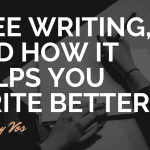5 Ways to Start the Process of Writing
Tackling the blank page can present an overwhelming challenge for some writers. Hence the tendency writers have to romanticize the notion of “writer’s block.” Whether writer’s block warrants all the air time that it gets, the fact remains, getting started is hard.
With that in mind, here are 5 easy ways that you can overcome the tendency to procrastinate and get the writing process started.
1. Start in the middle… or at the end
Your first sentence, your opening paragraph or scene (depending on if you’re writing fiction or nonfiction) are incredibly important. But there is no rule that says the first word you put down on paper has to be the one that comes at the very beginning.
Truly, you should start writing wherever you feel most drawn toward. Maybe there are some juicy points you are itching to tackle in the middle of your article. Go for it. Or maybe the climax scene of your thriller novel is calling to you like an old friend. Go to her. You can always circle back around and fill in the beginning later.
The benefit of doing it this way is that you avoid writing a bunch of words that would have probably gotten edited out in subsequent drafts, anyway.
2. Give your piece a title first
It may seem backwards to do it this way, but it works. Having a title before you start can help focus your writing so you are less likely to wander down an unproductive path. There is no need to overthink your working title, either. By the time you get to the end, you will probably have found the right title and you can make the switch. No harm, no foul.
3. Lower your standards
Yes, you read that correctly. So many writers are perfectionists. It’s an admirable quality so long as it help you deliver great writing to your readers. But too many time perfectionism keeps writers from beginning. And even if a writer can manage to begin, they will be plagued with the need to edit every word almost before it hits the page. This can take an enormous amount of time. Using this method, it might take a writer the better part of a decade to write a novel — and that’s if they can even manage to get to the end.
The more productive way is to accept that your first draft is going to be unpublishable. In fact, you’ll find much more happiness in writing if you make it a game. Challenge yourself to write the worst first draft ever. Have fun with it. If you accept the premise that all writing is rewriting, then you know that the only way for the real work to begin is to get your words down on the page.
4. Create a synopsis
If you work out what you want to say ahead of time, the words will flow much easier for you. A synopsis can be as brief or as detailed as you like. There really is no reason to be formal about it, either. This is just you working out the problems of your story and marking the emotional beats that you want to hit on — or, in the case of non-fiction, this is just you casually going over all of the points you want to make.
5. Get excited about your topic
You’ve probably heard the old saying, if it bores you, it will bore your reader. This point may not apply as much to fiction writers who presumably are already writing on a topic they are passionate about. But journalists, freelancers and non-fiction writers often are called upon to write on topics they would not normally have any interest in. In cases like these, it is helpful to find the right angle or approach that can infuse the subject with an energy that you find more appealing. Maybe you came across some intriguing tidbit during your research phase. Great, try to use that to get fired up about your topic.
Simone Smith is a writer who deeply believes that inspiring company culture and good work-life
- 100 Screenwriting Ideas to Get You Writing - January 20, 2026
- 100 Winter Storm Writing Prompts - January 17, 2026
- 100 Haunted House Story Starters: Craft Your Scariest Tale Yet - January 10, 2026




